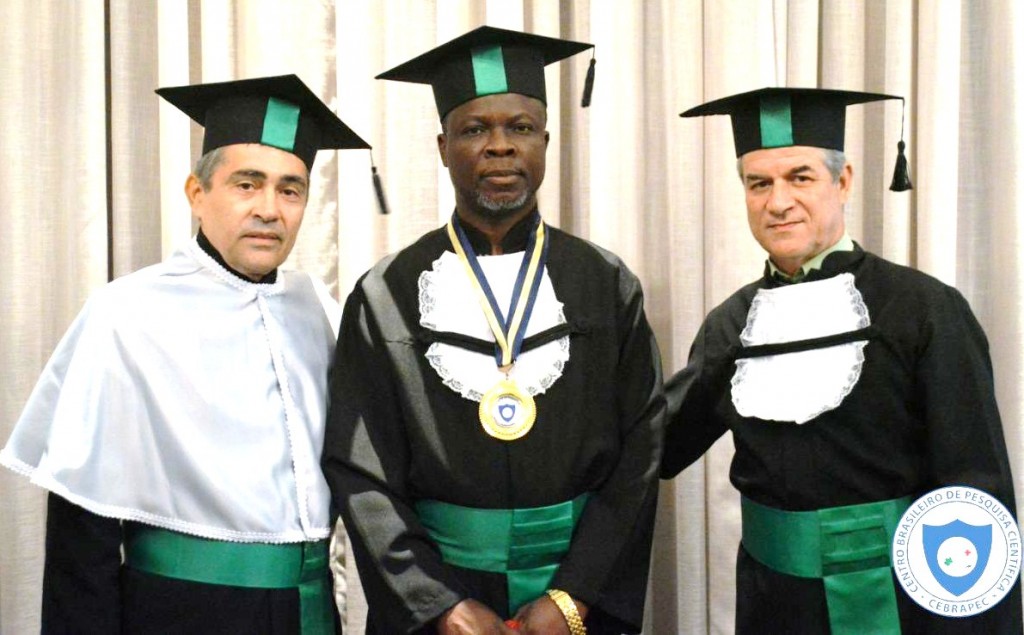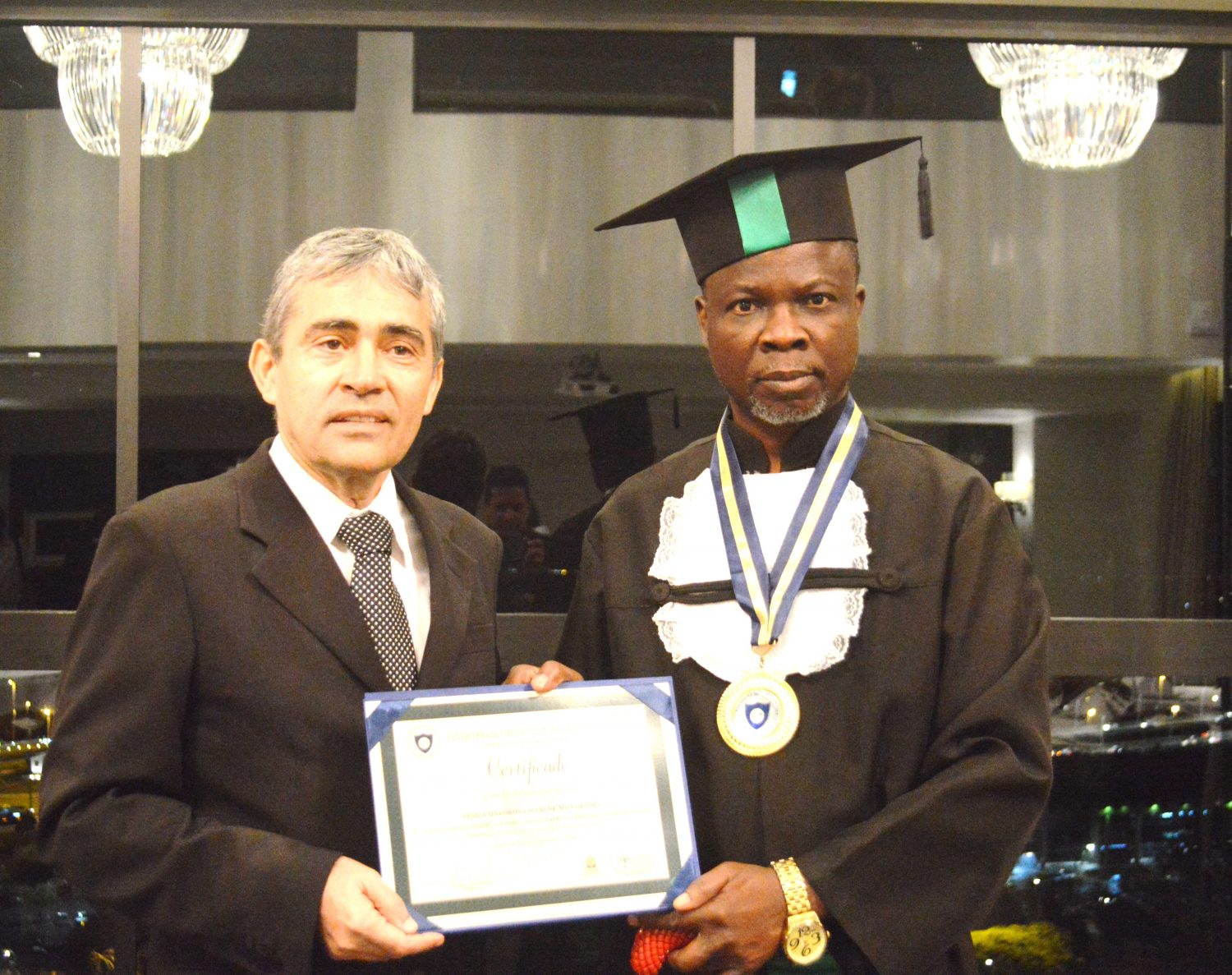Beninese politician Bertin Koovi receives honorary doctorate from Latin American universities

BY ALAN GREEN
Bertin Koovi, a Beninese politician and former presidential candidate, was awarded an honorary doctorate degree Friday night in Florianópolis, the capital of southern Brazil’s Santa Catarina state, by several Latin American universities, for his work on fundamental economics—the aspect of economics geared towards meeting fundamental needs with existing natural resources.
The decision to honor Koovi came from the reputable research institution that is the Centro Brasileiro de Pesquisa Científica Ltda. But it was an honor bestowed on him by several institutions: universities in Brazil, Mexico, Bolivia, Peru and Cuba. It came years after Koovi’s tour in these countries from 15 May to 28 August 2016 to lecture about fundamental economics, which, the local officials say, has helped their economies. The degree will later be certified by the Brazilian Ministry of Higher Education.
 In his address to the distinguished crowd of scholars and elected officials present, Dr. Koovi first cast a look back at history to point out the historical ties between Latin America—Brazil in particular—and Sub-Saharan Africa.
In his address to the distinguished crowd of scholars and elected officials present, Dr. Koovi first cast a look back at history to point out the historical ties between Latin America—Brazil in particular—and Sub-Saharan Africa.
He recalled the San Idelfonso Treaty of 1 October 1777 between King Carlos III of Spain and the Queen of Portugal, María I, that resulted in Portugal giving to Spain two of its African territories that are part of modern-day Equatorial Guinea, the Fernando Poo Island (now called Bioko Island) and the Island of Annobón, in exchange for the Santa Clara Island, and Colonia del Sacramento in present-day Southern Urugay. “I am certain,” Koovi said, “that the ancestry of many members of the black community in Santa Catarina goes back to Equatorial Guinea where Spain acquired some of its slaves.”
He added:
“These historical links compel us to collaborate in the context of the south-south relationship. Our states must engage in academic cooperation. No one should keep knowledge to themselves. Knowledge must be shared.”
He then called on the audience, singling out the world vice president of UNESCO clubs present, to help him to spread the theory of fundamental economics:
“Let’s spread and apply the concept of fundamental economics to stop Africans from risking their lives by crossing the Mediterranean in search of better opportunities in European countries; and Latin Americans from walking for 4,000 or 5,000 miles in quest of the American dream. If they were able to meet the five fundamental needs at home, they would not take such risks.”

Dr. Koovi stated his commitment to giving lectures on fundamental economics wherever he may be asked to do so.
Following the award ceremony in Florianópolis, the Bolivian parliament was ready to honor Dr. Koovi the next day for his contribution to the build-up of a fundamental economy in the country back in 2016. Later the same day, the Beninese scholar was to be awarded the equivalent of the U.S. Medal for Merit by none other than the president of Bolivia himself, Evo Morales, during a gala dinner at the presidential palace, with the local political elite and the diplomatic corps in attendance. Unfortunately, Dr. Koovi could not fly to Bolivia, due to extreme fatigue as a result of the long travel from Malabo to Florianópolis via Adis Ababa. The Bolivian parliament, instead, plans to travel to Malabo to honor him at home.
In an exclusive interview with “The African Magazine” minutes after receiving the honor, Dr. Koovi said he could not stop thinking, throughout the function, about the number of people who would have been saved from starvation, had their countries applied the theory of fundamental economics.
Dr. Koovi said he is indebted to President Obiang Nguema Mbasogo of Equatorial Guinea who, he said, inspired him about the theory of fundamental economics. Koovi remarked about Obiang’s commitment to economic diversification as a sine qua non approach to economic development.
Our new doctor also praised Nigeria’s president, Muhammadu Buhari, whom, he said, has applied the concept of fundamental economics to meet 95% of Nigeria’s need for rice, a major staple in the West African country. Koovi feels both presidents and their counterparts in the Congo (Brazzaville) and Sierra Leone also deserve an honorary doctorate in fundamental economics in recognition of their efforts.
One would be surprised, as this reporter is, that Benin, Dr. Koovi’s home country Benin has not been blessed by an economic theory that has earned him a recognition from thousands of miles away from home, in a high-profile ceremony.
Asked by “The African Magazine,” Koovi, who ran for president of Benin in 2016, said:
“I called on my fellow-Beninese to join me so we can turn Benin into a country where we can all enjoy a good life. That’s why I ran for president, because fundamental economics is a public economic policy. But they did not believe me. They elected another candidate. And I made sure I told the latter my intention to advise him as to how to build a fundamental economy. Alas, he is yet to see that as an opportunity.”
Dr. Koovi also told “The African Magazine”:
“Fundamental economics is applied by the man or woman in power, or by delegation of power. Will the president of Benin delegate that power to me as it has been delegated to me in Equatorial Guinea?”

A native of Benin, Dr. Koovi currently lives in Equatorial Guinea where he served until recently as the official in charge of the good image of President Obiang Nguema Mbasogo. In this capacity, Dr. Koovi arranged for the Academic Council of the Ural State University of Economics in Russia to bestow upon President Obiang the title of Honorary Professor in December 2014, in a lavish ceremony held in Equatorial Guinea. President Obiang recently promoted Dr. Koovi to the position of higher commissioner attached to the office of the President of the Republic of Equatorial Guinea in charge of economic diversification. Koovi is responsible for contributing to the build-up of fundamental economics through fishing, cattle rearing, agriculture and tourism.
This distinction came to complement previous ones Dr. Koovi has been blessed with in the past, which include the following: Honoris Causa Doctor in Communication Psychology from the Ibero-American Higher Education Council in Lima, Peru (15 May 2016); World Ambassador for Higher Education from the World Academy for Education in Mexico, in July of the same year. This is not to mention several other titles bestowed upon the Beninese scholar.


